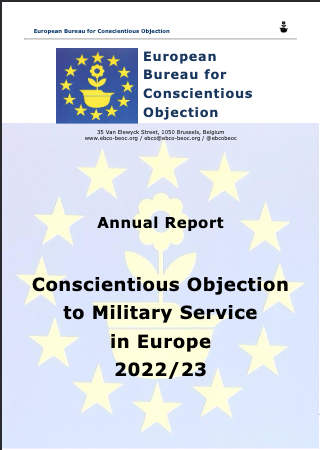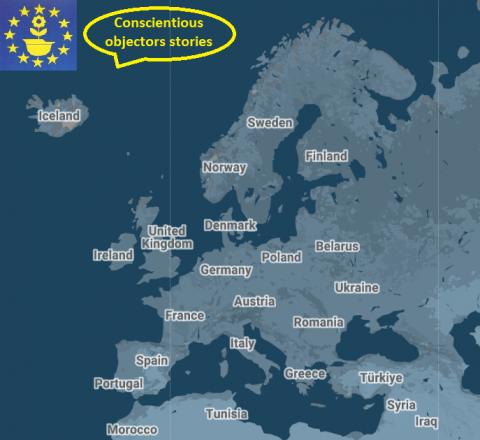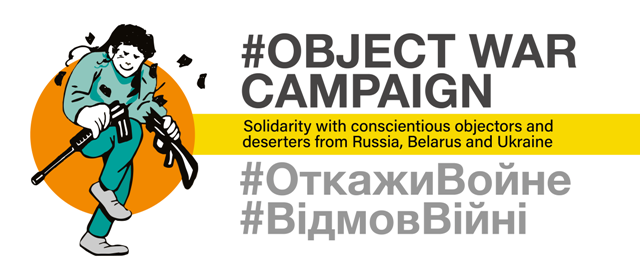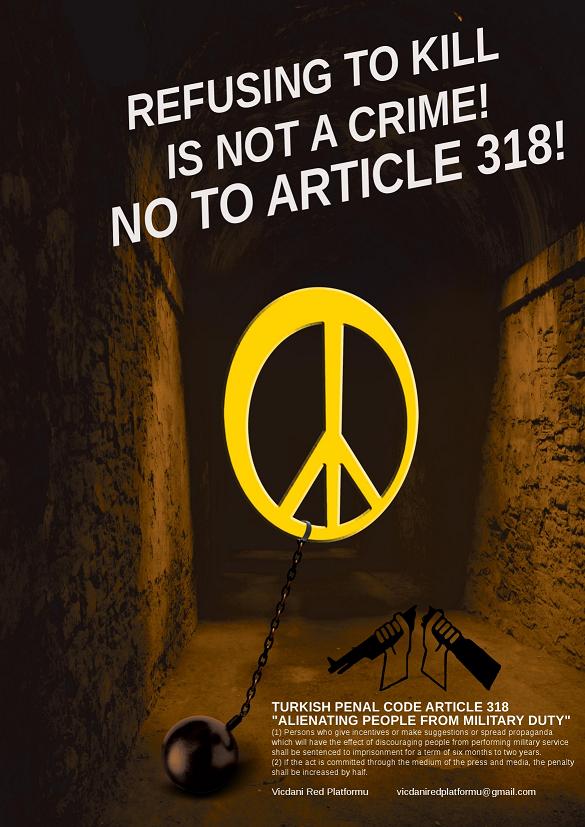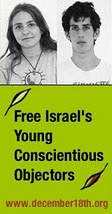Athens 25.3.2021 - Joint Submission by the European Bureau for Conscientious Objection (EBCO) and the Association of Greek Conscientious Objection (AGCO) to the UN Universal Periodic Review 39th session of the UPR Working Group, Oct-Nov 2021

In this joint submission, the European Bureau for Conscientious Objection and the Association of Greek Conscientious Objection provide information under section (a) Contributions to UPR documentation by “Other Stakeholders”, including civil society and national human rights institutions of the 3rd UPR cycle: contributions and participation of "other stakeholders" in the UPR.
Brussels, 25 March 2021
Submitting stakeholders: Ms. Alexia Tsouni (President of EBCO), Mr. Yiannis Gklarnetatzis (President of AGCO).
Keywords: Conscientious objection, freedom of conscience, human rights, civilian service, military service, conscription, Ministry of Defence, committee, violations, discrimination, prosecution.
The European Bureau for Conscientious Objection (EBCO) was founded in 1979 in Brussels, Belgium, as an umbrella organisation for national associations of conscientious objectors, with the aim of promoting collective campaigns for the release of the imprisoned conscientious objectors and lobbying the European governments and European/UN institutions for the full recognition of the right to conscientious objection to military service and the end of the discrimination against conscientious objectors. EBCO is involved in drawing up the annual report of the Committee on Civil Liberties of the European Parliament on the application by the Member States of its resolutions on conscientious objection and civilian service, as determined in the “Bandrés Molet & Bindi Resolution” of 1994; provides expertise and legal opinions on behalf of the Directorate General of Human Rights and Legal Affairs of the Council of Europe; enjoys participatory status with the Council of Europe since 1998 and is a member of the Conference of International Non-Governmental Organisations of the Council of Europe since 2005; is a full member of the European Youth Forum since 1995.
The Association of Greek Conscientious Objection (AGCO) is the member organisation of EBCO in Greece.
(1) In 1997, Greece was by 19 years the last of the then members of the European Union to accept conscientious objection to military service and make a substitute service available for conscientious objectors by Law 2510/1997. Laws 3421/2005, 3883/2010, 4361/2016 and 4609/2019 have amended some of the provisions of Law 2510/1997, but in many respects still the law falls far short of international standards.
(2) In specific EBCO and AGCO have particular concerns regarding the following issues: 1) The examination of the applications and the assessment of persons applying to perform civilian service still remain under the jurisdiction of the Ministry of Defence. This is in breach with the principle that states should establish independent and impartial decision-making bodies to consider applications based on conscientious objection; 2) The duration of the civilian service remains punitive and discriminative in nature. Currently the full military service is 12 months, whereas the full civilian service is 15 months. Other conditions of civilian service are also largely problematic (e.g. to be served without adequate financial support); 3) Lack of adequate information on the possibility of applying for recognition as a conscientious objector (nothing cited neither in the registration nor in the call-up papers); 4) Strict time-limits for the submission of any application for recognition as a conscientious objector, accompanied by all the required documentation which is difficult to be acquired. Applications must be received at the latest on the day set for enlistment, with no postponement permitted. Over the years, this has meant that some applications have in practice been rejected on purely procedural grounds, without being considered on their merits; 5) Restrictive definition of conscientious objection a priori and arbitrary refusal of recognition. The candidate conscientious objector is required by the law to prove that his life complies with his beliefs. Excluded, for no logical reason, is anyone who has ever held a firearms license (applicants have to provide a certificate from the police showing that they have never done so), or been a member of a hunting club, or participated in shooting sports, or been sentenced for crime related to use of guns, ammunition or illegal violence or even are currently prosecuted for such crime (which is in violation of the right to the presumption of innocence, Article 14.2 of ICCPR); 6) Possible revocation of the conscientious objector status for several reasons; 7) No provision for those who developed conscientious objection after starting military service or for the professional soldiers.
(3) The application of the system in practice has been marked by discrimination between conscientious objectors on the grounds of ideological beliefs and religious adherence and there has been arbitrary refusal of recognition. There are serious concerns about the questionable opinions of the Special Committee in the Ministry of Defence which advises the Minister on the applications for conscientious objector status, especially on the ideological applications for civilian service. This committee gives a positive opinion on all the applications of the baptized Jehovah's Witnesses, which are the vast majority (without even requesting an interview of them); whereas it usually gives a negative opinion on most of the applications of the non-baptized Jehovah's Witnesses and persons from other religious groups, and occasionally of conscientious objectors on ideological grounds (and requests an interview of all of them). This discrimination should end because all fundamental beliefs are equally protected by the international standards on freedom of thought, conscience, or religion. To separate them into those deemed “religious” and “other” is a primary act of discrimination, even before the differential treatment of the two categories is taken into account. Indeed, the question is thus raised of whether even the favourable decisions are really based on proof of the objection or proof of the denominational adherence of the applicant.
(4) These young persons who do not apply for civilian service because of its punitive and discriminatory nature or because they can not afford its financial cost, as well as these young persons who do apply but have their applications rejected, are then called up for military service, and if they do not enlist, they are repeatedly persecuted. So an endless circle begins with arrests, trials and penal convictions by military courts (although conscientious objectors are civilians), with suspended sentences of up to two years’ imprisonment accompanied with huge administrative penalties of 6000 euros for each insubordination charge (the 6000 euros fine is increased if not paid immediately and has a risk of confiscation of property or even imprisonment). This unacceptable practice continues and it is a vicious circle. There is no limit in the number of administrative penalties of 6,000 euros for a conscientious objector.
(5) The trials of conscientious objectors in military courts are a violation of the right to a fair and public hearing by a competent, independent and impartial tribunal (Article 14.1 of ICCPR and Article 6 of ECHR as the European Court of Human Rights has stated in similar cases of Turkish Conscientious Objectors).
(6) There are also serious concerns about the trials in absentia, as in the case of conscientious objector Yiannis (Ioannis) Gklarnetatzis. These violate the right to a fair trial, to be tried in one’s presence (Article 14.3 (d) of ICCPR).
(7) For several years the Human Rights Committee found violations of the principle of “ne bis in idem” for conscientious objectors who were punished more than once for refusal to undertake military service. However, in 2015, the Human Rights Committee found that imprisonment, and not just repeat imprisonment, of conscientious objectors was a violation of article 9 of the Covenant, stating: “Just as detention as punishment for the legitimate exercise of the right to freedom of expression, as guaranteed by article 19 of the Covenant is arbitrary, so is detention as punishment for legitimate exercise of freedom of religion and conscience, as guaranteed by article 18 of the Covenant.” The Human Rights Committee has subsequently called for the expunging of criminal records of those prosecuted. Similarly, the UN Working Group on Arbitrary Detention’s position has evolved from finding repeated imprisonment of conscientious objectors to be arbitrary detention to recognising that detention of a conscientious objector is a violation of article 18(1) of the Covenant per se. The Working Group set out its key principles and understanding in a decision in 2018 and further clarified its position in its 2019 report to the UN Human Rights Council: «While each case depends on its own facts, the Working Group considers that the detention of conscientious objectors is a per se violation of article 18 (1) of the Covenant and such a detention will therefore usually lack a legal basis according to category I [no legal basis to justify the deprivation of liberty]. Moreover, given that the detention of conscientious objectors results from the exercise of the right to freedom of thought, conscience and religion under article 18 of the Covenant, it will also often fall within category II [deprivation of liberty for exercise of a protected right]. Finally, when the detention of conscientious objectors to military service involves discrimination on the basis of religion or belief, it will amount to a category V violation [deprivation of liberty on discriminatory grounds]”. [1]
(8) In the context of the 2nd Cycle of UPR, Greece has rejected[2] all the recommendations[3] concerning conscientious objectors.
(9) There has been continued harassment of conscientious objectors, including prosecutions and fines for insubordination. The most recent case was on 26/10/2020, when Greece brought another civilian to stand trial before a military court, and what is more, he was a conscientious objector, who had applied to serve an extremely punitive civilian service, and nevertheless his application to serve civilian service was rejected by the Ministry of Defence.[4] K.K., 45-year-old now, declared his conscientious objection on ideological grounds in 2003, and applied for civilian service, which at that time was 30-month-long, whereas the military service was 12-month-long. His application was rejected by the Ministry of Defence in 2004, following a negative opinion by the consultative special committee, widely known as “Conscience Examination Committee”. His appeals were also rejected. K.K., remaining always consistent with his beliefs, did not join the army. So he was subsequently charged with insubordination, and he was fined 6.000 euros. He refused to pay the fine, and finally the Tax Service confiscated the money from his bank account. A representative of EBCO attended the trial as an observer at the Military Court of Athens. EBCO called for the charges against K.K. to be dropped and for the confiscated money to be returned to him. K.K. was finally acquitted on procedural grounds. K.K. should have not been prosecuted in the first place, as his prosecution is in violation of the European and international human rights law. More specifically Greece’s treatment of K.K. throughout the years constitute: 1) Violation of his right to freedom of thought, conscience and religion (Article 18 of the International Covenant on Civil and Political Rights and Article 9 of the European Convention on Human Rights); 2) Violation of the right to freedom from discrimination (Article 26 of ICCPR and Article 14 of the ECHR) as he has been discriminated for reasons of belief; 3) Violation of the right to be free to leave any country, including his own (Article 12.2 of ICCPR and Article 2.2 of the 4th Protocol to the ECHR), as he has been prevented to travel abroad for several years; 4) Violation of the right to a fair and public hearing by a competent, independent and impartial tribunal established by law (Article 14.1 of ICCPR and Article 6 of the ECHR, as found by the European Court of Human Rights in the cases of conscientious objectors tried in military courts).
(10) The continuous persecution of K.K. and violation of his human rights illustrate not only the vindictive stance of the military authorities against the conscientious objectors, but also reflect the situation of many more conscientious objectors in Greece despite numerous condemnations by international human rights instruments and the repeated promises of several Greek governments for reform. Last but not least, it shows the even more discriminatory treatment of conscientious objectors by the current government, which has even abolished some of the positive amendments introduced by the previous government. An appeal against last year’s increase[5] of the length of alternative service to the Council of State (Greece’s Supreme Administrative Court) is still pending.
(11) The procedures for the CO status have resumed in July 2020. They had been suspended, after last year's law 4609/2019, of the previous government, changed the composition of the 5-member Special Committee (a.k.a. Conscience Examination Committee) by reducing the number of military officers from 2 to 1, and increasing the number of university professors from 2 to 3. Therefore, a new committee needed to be appointed by a Joint Ministerial Decision, which was issued with almost 15 months of delay.
(12) On the occasion of the 3d National report of Greece[6] on the implementation of the Revised European Social Charter, in June/July 2020, the Greek National Commission for Human Rights[7], Amnesty International[8] and EBCO[9] submitted three different documents with comments, to the European Committee of Social Rights of the Council of Europe, mainly on the issue of the duration of alternative service, in violation of Article 1, para. 2 of the European Social Charter (“the right of the worker to earn his living in an occupation freely entered upon”), highlighting last year's increase. EBCO and Amnesty International also cited the issue of the suspension of the procedures for CO status, by that time. In its submission[10] on 25/06/2020 EBCO concluded that conscientious objectors in Greece face multiple violations of their right to earn a living in an occupation freely entered upon, both in terms of the excessive duration of alternative service (compared with the duration of military service) as well in terms of the delays (lengthy procedures, further delays, the then “freeze” for more than a year) in processing their applications. Greece should take immediate measures in terms of legislation and practice in order to be in conformity with Article 1§2 of the Charter.
(13) On 03/03/2020, in a joint submission with IFOR, EBCO informed the UN Special Rapporteur on freedom of religion or belief about the negative developments concerning the right to CO in Greece.
Recommendations for action by the State under review
(14) EBCO and AGCO call for:
- immediate amendments to the Greek law and practice in order to refrain from prosecuting or otherwise harassing conscientious objectors, with no further action required from such persons, and suspend all prosecutions (including the repeated prosecutions in violation of the “ne bis in idem” principle);
- providing a civilian service in line with the European and international standards and recommendations.
Such standards require, among other things, that [11]:
- all individuals who object to compulsory military service on grounds of conscience, without discrimination on different grounds, have the opportunity to perform a non-punitive, non-discriminatory, genuinely civilian service of equal length to the one of the military service that is compatible with the reasons for objection;
- applicants are granted conscientious objector status without inquiry, as a best practice, and if there is a procedure of examination, this should be under the full control of civilian authorities, i.e. outside the Ministry of Defence and with no military participation in the body examining the applications;
- all individuals, including serving members of the armed forces, be allowed to register as conscientious objectors at any time before, during or after their conscription or performance of military service, without any restriction before or revocation after they acquire the status of conscientious objector;
- information on the right to conscientious objection and the means of obtaining conscientious objection status be readily available to all those liable to be conscripted to the armed forces, including in the registration form and the call-up papers.
[1] International Standards on Conscientious Objection to Military Service Revised Edition: 2021 by Laurel Townhead Based on original text by Rachel Brett, Quaker United Nations Office, https://quno.org/sites/default/files/timeline/files/2021/QUNO%20Conscientious%20Objection%20-%20International%20Standards_Revised%202021_FINAL.pdf
[2] UN Human Rights Council, Report of the Working Group on the Universal Periodic Review, Greece, Addendum, Views on conclusions and/or recommendations, voluntary commitments and replies presented by the State under review, (A/HRC/33/7/Add.1), 2 September 2016, p. 3.
[3] UN Human Rights Council, Report of the Working Group on the Universal Periodic Review, Greece, (A/HRC/33/7), 8 July 2016, recommendation 136.15 (Uruguay), 136.16 (Slovenia).
[4] EBCO Press Release Brussels 24-10-2020: Is this democracy? Greece brings another civilian before military court, available at https://ebco-beoc.org/node/469
[5] Joint Decision of the Deputy Minister of Finance and the Deputy Minister of National Defence Φ.421.4/7/228631/Σ.6400/24-09-2019 (Official Journal vol. B 3697/4-10-2019).
[6] Greece, 3d report on the Revised European Social Charter https://rm.coe.int/greece3-en-simplified-report-collective-complains/16809ce324
[10] Brussels - 25-6-2020 - Continuing violation of the European Social Charter in the case of alternative service for conscientious objectors in Greece. Submission of EBCO to the European Committee of Social Rights https://ebco-beoc.org/node/466
[11] Approaches and challenges with regard to application procedures for obtaining the status of conscientious objector to military service in accordance with human rights standards - Report of the Office of the United Nations High Commissioner for Human Rights, https://ap.ohchr.org/documents/dpage_e.aspx?si=A/HRC/41/23

